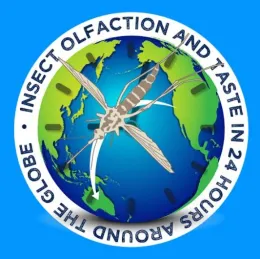
It's being loaded on YouTube.
The 24-hour free Zoom symposium, which began Wednesday, Aug. 11, drew attendees from 66 countries. UC Davis distinguished professor Walter Leal organized the event and co-hosted one of the three segments.
Nine videos from the symposium are now online, with more to follow:
- Video One is at https://youtu.be/QlyNCZtSvtY
- Video Two is at https://youtu.be/-aO8-1yfQRI
- Video Three is at https://youtu.be/2SsQvYlXKXY
- Video Four is at https://youtu.be/hmmEac7MliI
- Video Five is at https://youtu.be/60D99Z6nJI8
- Video Six is at https://youtu.be/rZ7i4d7VogQ
- Video Seven is at https://youtu.be/19ukK_R7eKE
- Video Eight is at youtu.be/eROTKZFhu9w
- Video Nine is at https://youtu.be/uVrESHyAyvU
Noted neuroscientist and keynote speaker John Hildebrand heralded the opening of the first-of-its kind international olfaction/taste symposium. Hildebrand is the Honors Professor and Regents Professor at the University of Arizona and the International Secretary of the National Academy of Sciences.
The symposium included 15 invited (keynote) and 36 contribution presentations,” said Leal, a UC Davis distinguished professor with the Department of Molecular and Cellular Biology and a former chair of the Department of Entomology (now the Department of Entomology and Nematology). Leal hosted the PDT segment. Wynand van der Goes van Naters of Cardiff University, UK, hosted the British Summer Time (BST) segment; and Coral Warr of La Trobe University, Australia hosted the Australia Eastern Standard Time (AEST) segment.
The presentations covered a wide variety of insects, including three species of mosquitoes (Culex, Aedes and Anopheles); honey bee (Apis mellifera); fruit flies (Drosophila melanogaster, Drosophila sechellia, and Drosophila suzukii); sand flies (the blood-sucking dipteran flies); cotton bollworm (Helicoverpa armigera); housefly (Musca domestica); cabbage butterfly (Pieris rapae); and the American cockroach (Periplaneta americana).
Some statistics:
- Total users (including those logging in periodically): 2,990
- 71 percent of the attendees surveyed said they were "very satisfied" with the symposium, and 12 percent "satisfied."
- 54 percent of the surveyed attendees had never attended a conference on chemosensation.
The survey yielded such comments as:
- "I used to work in the field of insect taste and olfaction and have attended a couple of ESITO meetings (European Symposium for Insect Taste and Olfaction) when I was a grad student and in early days as a postdoc. This was a wonderful opportunity to see that latest advances in the field and see many of the people whom I had met in person talk and some new people."
- "Thank you to the organizers for coordinating such an informative and well run virtual event."
- "Great collegial and convivial atmosphere. Really good idea to have a commentary on the lectures."
- "I am working on bark beetle olfaction, so I am available in the future with this topic. Thank you."
- "I learnt a lot from different groups especially disease vectors. It was a privilege to listen to some of the big names in this area. Looking forward to a future meeting."
- "I would like say the heartiest thanks to everyone who worked on this webinar. I am doing research for more than 10 years and I never experienced such a wonderful scientific event. What you have done can not be appreciated by words."
- "Undoubtedly, this is the best symposium I have ever attended to. I was able to join with almost every presentation. As an early-career researcher in chemical ecology, this inspired me a lot. Hope to present in this meeting and getting to know great scientists in the future. Hats off to the organisers. Thank you."
- "Thank you for organizing! I only wish there were more detailed times for each presentation so I could be sure to tune in for specific talks, but this is a great concept!"
The detailed schedule of times and speakers was purposely not announced in advance "in order to to keep attendance high when students, postdocs, and early-career scholars presented," Leal said, adding "I enjoyed listening to the student/early-career researchers talks. All of them were very interesting and well executed."
For more information and updates, follow Walter Leal on Twitter at @wsleal2014 or access his biochemistry channel where all the videos will be posted. Folks can also turn on YouTube and Chrome browser notifications to receive alerts.
(Editor's Note: See the initial news story, which includes the names of the presenters.)

